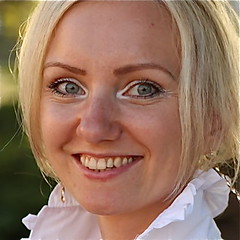
Justyna Zander
Harvard University
Fraunhofer Institute FOKUS
Computation of Things:
Challenges and Solutions for the Needs of Humanity
Presented with Pieter J. Mosterman
The current exponential growth of technologies is providing novel, frequently unimaginable ways of leveraging its applications for human needs. Ubiquitous communication capabilities allow a redefinition of an individual person as one who is becoming an integrated part of the virtual world and vice versa. The challenge of sustainable development of those trends from the perspective of a single human and humanity as such remains unsolved.
In the presented vision various aspects of the sustainability (e.g., the relation between a person’s quality of life, climate change, and social awareness) are highlighted to explore and share how an individual impacts and is impacted by the surrounding. Ultimately a technological solution called Computation of Things (CoTh) is outlined. It allows for a quick and reliable assessment of people’s possible decision paths and how this affects sustainable development on a local and global scale. Forecasting life-path alternatives for a human based on its geographic position (including pollution level, energy usage), activity patterns (including nutrition habits, lifestyle, travelling load, family status, circle of friends, social network, or virtual life), and state patterns (including individual’s DNA, current health conditions, musculature) is targeted.
CoTh enables an understanding of the individual self and its surrounding based on the micro-scale information that combines with macro-scale data to enable prediction of different life scenarios. It is defined as an abundant supply of predictive computation capabilities of high performance and large-scale applicability with high accuracy and quality so as to allow for providing humanity’s physical, physiological, mental, and spiritual needs in a profound and as of yet unfathomed manner.
Its core is strongly connoted with physical systems engineering. Thus, a parallelly-conducted research on the notion of computation deploys computational models as the primary representations of physics, instead of attempting to approximate first principles ever closer. A theory of treating models as dynamic systems themselves follows. This evokes the promise for a fundamental breakthrough in terms of computational semantics the significance of which becomes paramount as far as the faithfulness of the predictions is considered.
Dr. Justyna Zander is a Postdoctoral Research Scientist at Harvard University (Harvard Humanitarian Initiative) in Cambridge, MA, USA (since 2009) and Project Manager at the Fraunhofer Institute for Open Communication Systems in Berlin, Germany (since 2004). She holds Doctorate of Engineering Science (2008) and Master of Science (2005), both in the fields of Computer Science and Electrical Engineering from Technical University Berlin, Germany, Bachelor of Science (2004) in Computer Science, and Bachelor of Science (2003) in Environmental Protection and Management from Gdansk University of Technology, Poland.
She graduated from the Singularity University, Mountain View, CA, USA in 2009 where she then was a Teaching Fellow in 2010. Before she was a visiting scholar at the University of California in San Diego, CA, USA in 2007, and a visiting researcher at The MathWorks in Natick, MA, USA in 2008. Her research interests include heterogeneous system development, design, simulation, computation, humanities, and future studies.
For her scientific efforts Dr. Zander received grants and scholarships from such institutions as Polish Prime Ministry (1999-2000), Polish Ministry of Education and Sport (2001–2004), German Academic Exchange Service (2002), European Union (2003-2004), Hertie Foundation (2004-2005), IFIP TC6 (2005), German National Academic Foundation Grant (2005-2008), IEEE (2006), Siemens (2007), Metodos y Tecnologia (2008), Singularity University (2009), and Fraunhofer Gesellschaft (2009-2010). She is certified by the International Software Quality Institute.
